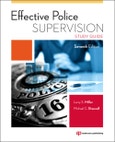This new edition, like the new edition of the textbook it accompanies, includes information on the following topics: police accountability, police involvement with news media, dealing with social media, updates on legal considerations, and avoiding scandals.
- Updated to coincide precisely with the 7th edition of Effective Police Supervision
- Each chapter includes learning objectives, key terms, chapter summaries, and review questions
- Includes access to the instructor and companion sites for Effective Police Supervision
Table of Contents
1. Supervision - The Management Task2. Community-Oriented Policing and Problem Solving - Improving Neighborhood Quality of Life
3. Interpersonal Communications - Striving for Effectiveness
4. Motivation - A Prerequisite for Success
5. Leadership - The Integrative Variable
6. Team Building - Maximizing the Group Process
7. Change - Coping with Organizational Life
8. Performance Appraisal - The Key to Police Personnel Development
9. Training, Coaching, Counseling, and Mentoring - Helping Officers Grow and Develop
10. Discipline - An Essential Element of Police Supervision
11. Internal Discipline - A System of Accountability
12. Supervising the Difficult Employee - Special Considerations
13. Supervising Minorities - Respecting Individual and Cultural Differences
14. Tactical Operations - Critical Incident Deployment
15. Labor Relations - Problem Solving through Constructive Conflict
16. Homeland Security and Terrorism - A Changing Role
Authors
Miller, Larry S.Larry S. Miller is Distinguished Professor and Chair of Criminal Justice and Criminology at East Tennessee State University (ETSU). He received his Bachelor of Science from ETSU, a Master of Science from Eastern Kentucky University, and his Ph.D. in Health & Safety with collaterals in Forensic Anthropology and Criminology from The University of Tennessee. Miller, who has worked as a police officer, criminal investigator, and crime laboratory director, teaches in the area of law enforcement and is the author of several books on topics including criminal investigation, criminal justice report writing, police photography, and more.
Braswell, Michael C.
Dr. Michael C. Braswell is Professor Emeritus of Criminal Justice and Criminology at East Tennessee State University (ETSU). Braswell received his Bachelor of Arts in Psychology from Mercer University in 1969, a Master of Arts in Psychology from West Georgia College in 1970, his Ed.S. in Rehabilitation/Correctional Counseling from the University of Georgia in 1973, and his Doctorate in Counseling Psychology from the University of Southern Mississippi. A former prison psychologist, he taught ethics and human relations courses for more than 30 years at East Tennessee State University. He has published books on ethics, peacemaking, and correctional counseling as well as two novels and a short story collection.








